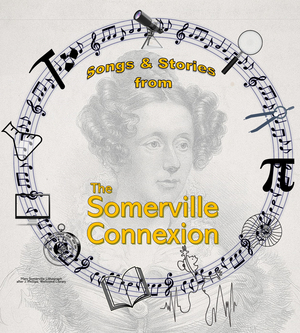Interview: Frances M. Lynch Talks SONGS & STORIES FROM “THE SOMERVILLE CONNEXION”
We talk to the artistic director of the Electric Voice Theatre about their new project to commemorate International Women's Day.

From spotlighting women in STEM and making their performances accessible to the disabled community, to experimenting with Zoom as a performance medium, the Electric Voice Theatre is continually interested in the unexpected and the inclusive.
Their latest concert, Songs & Stories from "The Somerville Connexion", revolves around 18th-century astronomer Mary Somerville. We sat down with artistic director Frances M. Lynch to discuss the project.
Tell us about the inspiration behind the music featured in your show
The whole point about this music is the connections with 'Queen of the Sciences', Mary Somerville, who features on our Scottish £10 notes. The word 'scientist' was actually coined for her. She led a really interesting life both in London and Italy, she was very active in society, and the concert is 'set' at one of her parties.
We've been able to perform the music of women composers who were around at the same time, and celebrate female singers, such as Clara Novello (daughter of Vincent Novello), who used to sing for Mary in her home at her 'evening events' - she never called them parties.
Another singer, Jane Bianchi, performed at concerts of 'ancient music', and set a poem written by Amelia Opie, a friend of Somerville's through her work for the anti-slavery movement, to music. The piece is quite Handellian, at a time when singing Handel was what made you famous. There's also a bit of Beethoven we've allowed to sneak in, a setting of an Irish song by Joanna Baillie.
The other works are by contemporary composers. Cheryl Frances-Hoad has set to music some words by Ada Lovelace, who wrote the first computer programme, and there's one written by me about her and the history of women in computing. Mary also knew her father Byron, though she didn't have much to do with him after he disgraced himself! Our show mainly focusses on the women though - these networks between women that existed and how they supported each other.
How does the concert integrate music with theatre?
Well, it's on Zoom so not staged in the traditional sense. There'll be four singers from Electric Voice Theatre, with me playing Mary (as the only Scot!) and the others are fellow socialites attending the event.
The others are performing things that really would have been performed in that time period, and it's like you're actually at the party: you hear the gossip about who's there and who isn't. We also have three young singers, who'll be appearing pre-recorded as different parts of computers - they're making the sounds of Charles Babbage's engine, the huge colossus. It's a fun piece, it's definitely not meant to be serious.
How has Electric Voice Theatre's broadened perspective regarding disability informed this work?
We have a British Sign Language interpreter throughout - all our actions are related to BSL. This is something we do as a rule, rather than adding on; inclusivity and diversity of all kinds are so important. Why leave out half the people who'd want to see it? We've always managed to take a BSL interpreter to all of our live shows too, even to the most remote of islands.
Performing on Zoom must come with its challenges. How have you dealt with these?
Hundreds! It's very difficult, but wonderful to be able to do it since our virtual choir are from all over the world. But it's challenging that every singer is playing backing tracks in their own rooms, everyone has different-sized rooms, different acoustics, and we have to sync it all up.
Zoom isn't designed for performances - we have to mess about with it to get it to work - but it's a fun challenge! It's interesting because of different audience experiences: some will have better sound systems than others, some will be more adept with Zoom. You can't really legislate for how people will listen to it. All we do is tell them to wear headphones. We've been lucky to get advice from others. You just have to try and make it work.
Songs & Stories from "The Somerville Connection" is on 8 March - book here
Comments

Videos
